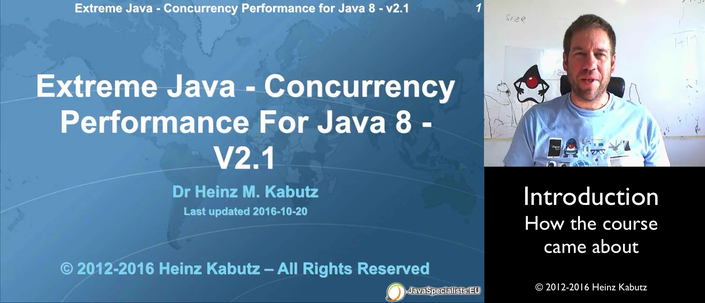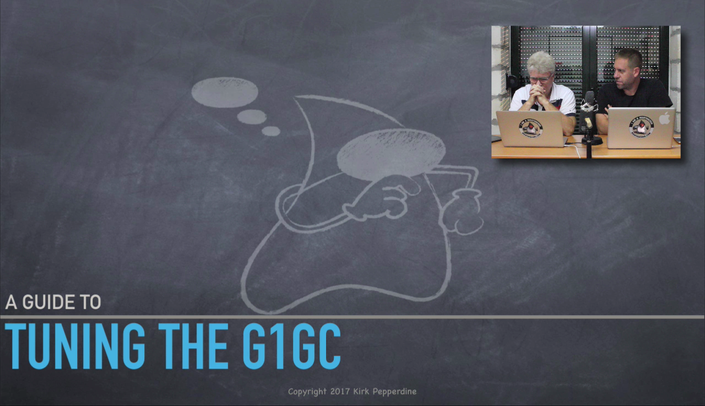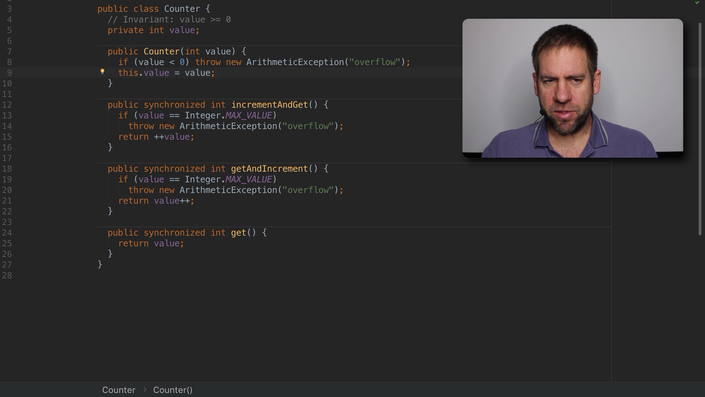
Extreme Java Camp Crete July 2018 - Concurrency Performance $3338
Hottest Training on Java Concurrency
Would you like to join us on the island of Crete for a unique learning experience? Wake up early to the sound of cicadas, grab a coffee and hop into the azure sea where octopi play hide-and-seek. After a refreshing orange juice, head over to Java Specialists Headquarters. We start at 9:00, just as the dry Cretan landscape is starting to bake. A couple of coffee breaks in our verdant garden, and delicious Cretan Taverna food for lunch. Hop into our pool to refresh yourself during class. The class is intense and the exercises require your full concentration. By 5 PM your brain is cooked and you're ready for adventure. The locals are rousing from their siestas and families are flocking to the beach. Tersanas is a 1 km walk through the olive groves. Stavros and Kalathas only 3 km away. Agia Triada and Gouverneto Monasteries beckon for you to visit. And through it all, the cicadas are humming their melodious tune.
Seriously, what will you learn? Should you spend your hard earned training budget on such an adventure? You will learn more in these 3 days than you have ever learned before in the same amount of time. After you have finished the course, you will get access to a professional recording. You can revise anything that you might want to go over again.
Why should you do this concurrency course? It is the only course officially endorsed by Brian Goetz, the author of Java Concurrency in Practice. The course is loosely based on the book, but with up-to-date information including Java 9 and 10.
The course costs US$ 3338. This includes all the training material, lunches, coffees, and an dinner on the last day after class at Heinz's house. And we have an excursion Thursday evening for those interested.
Obviously, we want you to experience Crete with us. But not everybody can convince their boss to send them to Crete at company expense in July. The auditors might have a heart attack. Yes, this is a genuine course. And it is very tough. From 9 till 5 we work hard. Very hard. Maybe too hard? Students cannot miss any part of the 3 days if they want their certificate of completion. Plus they have to demonstrate competence by completing all the required exercises. Since this training is in such a gorgeous location, we are super strict about attendance.
What if you cannot attend physically? Perhaps the flights are too expensive, or your company has a policy forbidding you to travel to anywhere pleasant. In that case, you can attend the course via live virtual class. We will do everything to make you feel like you're part of what's happening here in Crete. Unfortunately, you won't be able to join us for lunch nor for the excursion. But all the lectures can be streamed live with two-way communication. You will be able to hear the students and me of course. The price for the live virtual class is the same as if you attend in person: US$ 3338. We will not make recordings of the live sessions.
Maximum number of students in the class: 6 in our classroom on Crete and 6 remote via live virtual.
Availability: 5/6 physical attendance, 6/6 live virtual attendance. Filling up fast!
Dates of Course
The dates are from the 18-20 July 2018. We start each day at 09:00 Athens Time (06:00 UTC) and finish at 17:00 (14:00 UTC). We have a lunch break from 12:00-13:00.
When Is Payment Due
Please email heinz@javaspecialists.eu to reserve your place. Full payment is due on the 30th of June via this Teachable platform. Please do not pay more than 30 days before the start of the course, as we will then not be able to give you a refund in case of cancellations. You can pay via PayPal or Credit Card. Please also only book your travel once you have confirmed that we have a space available for you.
(All prices are excluding EU VAT, which will be charged automatically by Teachable on checkout).
Detailed Outline - Extreme Java - Concurrency Performance
Day 1
- Introduction
- Welcome To The Course
- How we deal with questions
- Exercises with partial solutions
- Certificate of Training
- History of concurrency
- New supercomputers
- Moore's Law
- Hardware impact of concurrency
- Benefits of threads
- Programming is easier
- Better throughput
- Simpler modeling
- Risks of threads
- Safety vs liveness
- Safety hazards
- Using basic synchronized
- Caching of fields
- Code reordering
- Annotations for Concurrency
- Class annotations
- Field annotations
- Threads are everywhere
- Threads created by JVM
- Threads created by frameworks
- Timer
- Servlets and JavaServer Pages
- Remote Method Invocation (RMI)
- Short Java 7 and 8 Primer
- Underscores in integral literals
- Generic type inference
- Lambdas
- Method References
- Streams
- Primitive Streams
- Thread Safety
- Introduction to Thread Safety
- Synchronization and shared data
- Your program has latent defects
- Atomicity
- Byte code generated by simple count++
- Demonstration of broken servlet
- Compound actions
- Check-then-act
- Read-write-modify
- Sharing Objects
- Visibility
- Synchronization and visibility
- Reason why changes are not visible
- Making fields visible with volatile
- Volatile flushing
- Thread confinement
- Unshared objects are safe
- Ad-hoc thread confinement
- ThreadLocal
- Stack confinement
- Immutability
- Immutable is always thread safe
- Definition of immutable
- Final fields
- Designing a thread-safe class
- Encapsulation
- Primitive vs object fields
- Thread-safe counter with invariant
- Post-conditions
- Pre-condition
- Waiting for pre-condition to become true
- Building Blocks
- Synchronized collections
- Old Java 1.0 thread-safe containers
- Synchronized wrapper classes
- Locking with compound actions
- Concurrent collections
- Scalability
- ConcurrentHashMap
- New Java 8 methods
- Additional atomic operations
- Java 8 ConcurrentHashMap
- CopyOnWriteCollections
- Blocking queues and the producer-consumer pattern
- How BlockingQueues work
- Java implementations of BlockingQueue
- ArrayBlockingQueue
- Circular array lists
- LinkedBlockingQueue
- PriorityBlockingQueue
- DelayQueue
- SynchronousQueue
- TransferQueue
- Deques
- ArrayDeque
- LinkedBlockingDeque
- ConcurrentLinkedDeque (Java 7)
- Work stealing
- Good defaults for collections
- Synchronizers
- CountDownLatch
- FutureTask
- Semaphore
- CyclicBarrier
- Phaser (Java 7)
- Task Execution
- The Executor framework
- Executor interface
- Motivation for using Executor
- Decoupling task submission from execution
- Execution policies
- Who will execute it?
- In which order? (FIFO, LIFO, by priority)
- Various sizing options for number of threads and queue length
- Thread pool structure
- Thread pool benefits
- Memory leaks with ThreadLocal
- Standard ExecutorService configurations
- ThreadPoolExecutor
- Executor lifecycle, state machine
- Shutdown() vs ShutdownNow()
- Finding exploitable parallelism
- Breaking up a single client request
- Sequential vs parallel
- Callable and Future
- Callable controlling lifecycle
- Example showing page renderer with future
- Limitations of parallelizing heterogeneous tasks
- CompletionService
- Time limited tasks
- Using Parallel Streams (Java 8)
- Transforming collections into streams
- Limitations of using parallel streams for IO
- Finding prime numbers in parallel
- Filtering and mapping streams
- Configuring underlying Fork/Join framework
- Cancellation
- Cancellation
- Reasons for wanting to cancel a task
- Cooperative vs preemptive cancellation
- Using flags to signal cancellation
- Cancellation policies
- Interruption
- Origins of interruptions
- How does interrupt work?
- Policies in dealing with InterruptedException
- Thread.interrupted() method
- Responding to interruption
- Letting the method throw the exception
- Restoring the interrupt and exiting
- Ignoring the interrupt status
- Saving the interrupt for later
- Non-interruptible blocking
- Reactions of IO libraries to interrupts
- Interrupting locks
Day 2
- Thread Pools
- Homogenous, independent and thread-agnostic tasks
- Sizing thread pools
- Danger of hardcoding worker number
- Problems when pool is too large or small
- Formula for calculating how many threads to use
- CPU-intensiv vs IO-intensive task sizing
- Examples of various pool sizes
- Mixing different types of tasks
- Determining the maximum allowed threads on your operating system
- Configuring ThreadPoolExecutor
- corePoolSize
- maximumPoolSize
- keepAliveTime
- Using default Executors.new* methods
- Managing queued tasks
- PriorityBlockingQueue
- Saturation policies
- Abort
- Caller runs
- Discard
- Discard oldest
- Thread factories
- Customizing thread pool executor after construction
- Fork/Join
- Basics
- Breaking up work into chunks
- ForkJoinPool and ForkJoinTask
- Work-stealing in ForkJoinPool
- ForkJoinTask state machine
- RecursiveTask vs RecursiveAction
- Example of a parallel recursive function
- Parallel Fibonacci Calculator
- Fork/Join vs. Compute
- Parallel merge sort
- Sorting in Java 8
- Managing tasks
- Canceling a task
- Visibility guarantees with fork/join
- Use cases of fork/join
- Using new parallel streams in Java 8 to simplify code
- Avoiding Liveness Hazards
- Deadlock
- The drinking philosophers
- Causing a deadlock amongst philosophers
- Resolving deadlocks
- Discovering deadlocks
- Lock-ordering deadlocks
- Defining a global ordering
- Dynamic lock order deadlocks
- Defining order on dynamic locks
- Checking whether locks are held
- Imposing a natural order
- Deadlock between cooperating objects
- Open calls and alien methods
- Example in Vector
- Resource deadlocks
- Avoiding and Diagnosing
- Avoiding multiple locks
- Using open calls
- Unit testing for lock ordering deadlocks
- Adding a sleep to cause deadlocks
- Verifying thread deadlocks
- Deadlock analysis with thread dumps
- Livelock
- Causes
- How to detect
- Testing Concurrent Programs
- Testing for correctness
- Checking for data races
- Automatic tooling
- JChord
- JavaRaceFinder
- FindBugs
- IntelliJ IDEA
- False positives
- Memory requirements of automatic tools
- Testing through bulk updates
- Server HotSpot interference
- Testing pitfalls
- Controlling HotSpot and JIT
- Turning off optimizations
- Randomizing bulk operations
- Testing field visibility
- Single updates, with time delays
- Pros and cons of various approaches
- Examples of testing broken code
- Testing for deadlocks
- Testing for performance
- HotSpot tricks
- Loop unrolling
- Useless code elimination
- Inlining of method calls
- Lock eliding
- Lock coarsening
- Eliminating object creation
- HotSpot interference in microbenchmarks
- HotSpot method call threshold
- HotSpot compile time
- Getting the fastest most optimized code
- Randomization
- Ensuring HotSpot does not overoptimize
- Math.random() vs ThreadLocalRandom
- Cost of remainder calculation
- Statistics
- Average and variance
- Value of the minimum
- Excluding warmup results
- Eliminating interference
- Length of timings
- Value of including standard deviation
- Concurrent performance Testing
- Difference between single and multi-threaded test
- ArrayList vs CopyOnWriteArrayList iteration benchmark
- Context switching cost interference
- Performance and Scalability
- Thinking about performance
- Effects of serial sections and locking
- Performance vs scalability
- How fast vs how much
- Mistakes in traditional performance optimizations
- 2-tier vs multi-tier
- Evaluating performance tradeoffs
- Amdahl's and Little's laws
- Formula for Amdahl's Law
- Utilization according to Amdahl
- Maximum useful cores
- Problems with Amdahl's law in practice
- Formula for Little's Law
- Applying Little's Law in practice
- How threading relates to Little's Law
- Costs introduced by threads
- Context switching
- Cache invalidation
- Locking and unlocking
- Memory barriers
- Escape analysis and uncontended locks
- Lock elision
- Reducing lock contention
- Exclusive locks
- Safety first!
- Narrowing lock scope
- Using ConcurrentHashMap
- Performance comparisons
- Reducing lock granularity
- Lock splitting
- Using CopyOnWrite collections
- Lock striping
- In ConcurrentHashMap
- In ConcurrentLinkedQueue
- Avoiding "hot fields"
- ReadWriteLock
- Immutable objects
- Atomic fields
- How to monitor CPU utilization
- Reasons why CPUs might not be loaded
- How to find "hot locks"
- Hotspot options for lock performance
- Explicit Locks
- Lock and ReentrantLock
- Memory visibility semantics
- ReentrantLock implementation
- Using the explicit lock
- Using try-finally
- tryLock and timed locks
- Using try-lock to avoid deadlocks
- Interruptible locking
- Performance considerations
- Java 5 vs Java 6 performance
- Throughput on contended locks
- Uncontended performance
- Heavily contended locks
- Synchronized vs ReentrantLock
- Memory semantics
- Ease of use
- Prefer synchronized
- Read-write locks
- ReadWriteLock interface
- Understanding system to avoid starvation
- ReadWriteLock implementation options
- Release preference
- Reader barging
- Reentrancy
- Downgrading
- Upgrading
- StampedLock (Java 8)
- Difference between StampedLock and ReentrantReadWriteLock
- Pessimistic reading and writing
- Optimistic reading
- Conditional changes by upgrading read to write lock
- Performance differences between StampedLock and ReentrantReadWriteLock
Day 3
- Building Custom Synchronizers
- Managing state dependence
- Single-threaded vs multi-threaded
- Structure of blocking state-dependent actions
- Example using bounded queues
- Introducing condition queues
- With intrinsic locks
- Using condition queues
- State-dependence
- Condition predicate
- Lock
- Condition queue
- Waking up too soon
- Waiting for a specific timeout
- Conditional waits
- Missed signals
- InterruptedException
- notify() vs notifyAll()
- Encapsulating condition queues
- Explicit condition objects
- Condition interface
- Benefits of explicit condition queues
- Timed conditions
- Atomic Variables and Nonblocking Synchronization
- Disadvantages of locking
- Elimination of uncontended intrinsic locks
- Volatile vs locking performance
- Priority inversion
- Hardware support
- Optimistic locking
- Compare-and-Swap (CAS)
- Compare-and-Set
- Managing conflicts with CAS
- Simulation of CAS
- Nonblocking counter
- CAS support in the JVM
- Shared cache lines
- Performance advantage of padding
- Using @sun.misc.Contended (Java 8)
- Atomic variable classes
- Optimistic locking classes
- Very fast when not too much contention
- Types of atomic classes
- How do atomics work?
- Atomic array classes
- LongAdder and LongAccumulator (Java 8)
- Performance comparisons: Locks vs atomics
- Cost of atomic spin loops
- Nonblocking algorithms
- Scalability problems with lock-based algorithms
- Definition of nonblocking and lock-free
- Nonblocking stack
- Doing speculative work
- Performance - Java Memory
- Garbage Collection
- Generational Spaces
- Difference between young and old GC
- Stop-The-World events
- Throughput Collector (Parallel)
- How it works
- Tuning the throughput collector
- Concurrent Mark Sweep Collector
- Various phases either STW or Concurrent
- Types of serious STW failures
- Concurrent Mode Failure
- Promotion Failed
- Perm/Meta GC
- Tuning the throughput collector
- G1 Collector
- How it works
- Tuning the G1 collector
- Sizing the collector
- Total Heap
- New/Old
- Eden/Survivor
- Tenuring threshold
- Working example in tuning a large Fibonacci number calculation
- Measuring GC Activity
- Flags for generating GC logs
- Understanding GC information
- References
- Reference Objects
- Object Reachability
- Using References
- SoftReference
- WeakReference
- PhantomReference
- Java Optimizations
- 15.1. Tuning Process
- Optimization Techniques - Big Gains Quickly
- Specifying the required performance
- Optimization methodology
- System Overview - "The Box"
- Analyzing CPU bottlenecks
- Microbenchmarking
- Java Microbenchmarking Harness (JMH)
- 15.2. JIT and HotSpot
- Just-in-Time
- HotSpot
- Client
- Server
- Tiered Compilation
- VM Switches
- Effects on performance and benchmarking
- 15.3. Typical Problem Areas
- Object Creation
- Array creation
- Temporary objects
- Lazy initialization
- Strings
- intern
- StringBuilder vs StringBuffer vs String
- char[] creation with modifying methods
- += complexity
- String appending performance
- Parsing Strings
- substring() in various versions of Java
- String deduplication (Java 8)
- Regular Expressions
- Exception performance
- Loops
- Tuning loops
- Extracting invariants
- Method calls
- Arrays and loops
- Cache lines
- Calls to JNI
- Benchmarking
- Other Areas
- Final
- Conclusion
- Tips on where to learn more
- Thank you!
Your Instructor

Heinz Kabutz is the author of The Java Specialists’ Newsletter, a publication enjoyed by tens of thousands of Java experts in over 150 countries. He has been a Java Champion since 2005.
Courses Included with Purchase








